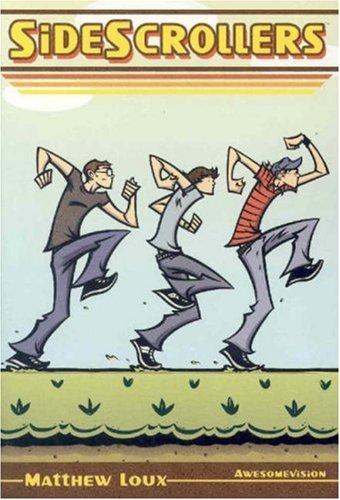
The National Coalition Against Censorship’s blog has a new interview with Matt Loux, whose graphic novel SideScrollers was recently removed from an Enfield, Connecticut, high school’s summer reading list after one resident complained of profanity and sexual references. CBLDF and NCAC have joined with several other organizations to contest the removal, pointing out that the Enfield Board of Education failed to observe its own policies in the matter.
In the interview, Loux discusses his effort to make the characters and dialogue in Sidescrollers seem realistic:
I started writing it during my late teens so I guess that’s just how I talked back then. I don’t swear nearly as freely these days…. Writing natural-feeling dialog is very important to me. I work hard to achieve a comfortable flow in all of my stories…. I quickly discovered that no matter the age group, you must write what feels natural to yourself and the characters you created. When you start to really understand your characters and how they would react in situations, that’s when it all falls into place.
Loux also weighs in on the issue of book ratings, which he feels have not stifled his expression as an author and artist:
I’m OK with [ratings]. There’s nothing wrong with providing information for people. It can help a parent identify whether they think a book is appropriate for their child or not. From a creator’s point of view, it does force you to compartmentalize your story a bit, but that’s the reality of all publishing these days.
Loux feels that the authenticity of the book would have suffered if he had tempered the language or the situations his characters found themselves in:
Not for a second did I ever think of parents while writing SideScrollers. This was a story for me and my peers. It was a silly, fun, unedited take on how real teens interact. This included language, sexual situations, and even crass and slightly inappropriate jokes. When writing comedy you have to be completely genuine or it will come across as trite.
I was very conscious of all this while writing but I also believe that the overall themes of SideScrollers are positive and even uplifting. Friendship, happiness, standing against adversity, anti-bullying.
I also didn’t mean for it to be taken too seriously either. It is what it is and I don’t think there’s any harm in it. If I had changed a single idea based on fear of a parent’s possible negative reaction, the book would have died an immediate and mediocre death.
Finally, Loux questions why one parent should be allowed to decide what all students may read:
I understand how folks get sensitive to anything regarding their kids, but honestly no one has the right to say someone else’s child can’t read a book because you don’t think your own kid can handle it. What if they stopped teaching Romeo and Juliet in schools because some parent with no knowledge of historic context objected to the fact that Juliet is thirteen?
(We interrupt this interview to note that this scenario is not terribly far-fetched.)
Ultimately, says Loux, many high school students are mature enough to process books like SideScrollers and should be given the option to read them:
In my own experience, high school was a defining line between childhood and pre-adult. I started to better understand nuanced adult concepts and I was ready for them. And I certainly didn’t learn how to swear from a book or movie. It was from other students, and parents of course.
Stay tuned to CBLDF for updates on this story!
Please help support CBLDF’s important First Amendment work and reporting on issues such as this by making a donation or becoming a member of the CBLDF!
Maren Williams is a reference librarian who enjoys free speech and rescue dogs.